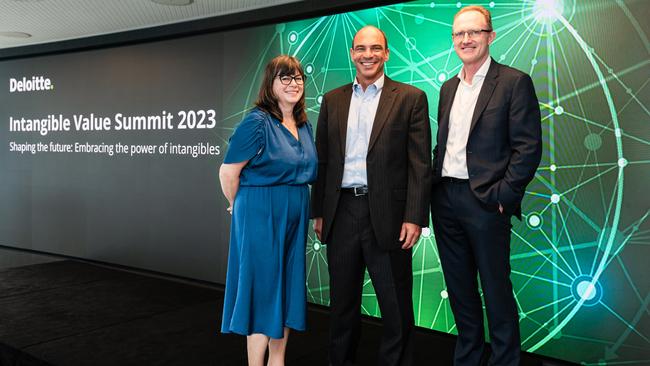Deloitte finds $1.18 trillion in intangibles go unaccounted in Australia’s markets
The true value of Australia’s biggest firms has not been revealed to investors, with almost $1.18 trillion of assets absent from the balance sheets of ASX100 firms, new research reveals.

Business
Don't miss out on the headlines from Business. Followed categories will be added to My News.
The true value of Australia’s biggest companies has not been revealed to investors, with almost $1.18 trillion of assets absent from the balance sheets of ASX100 firms, new research reveals.
Writing in The Australian, Deloitte partners Frances Drummond and Tim Heberden note that almost half the value (46 per cent) of the 100 largest firms is unknown under current accounting rules because they are intangibles – identifiable assets that don’t physically exist, such as brands, patents or data.
These assets are often only clear in the case of an acquisition, when businesses carry their value on their balance sheets.
Deloitte warns companies and investors have limited knowledge of the health and value of “homegrown intangibles” under current accounting rules.
Mr Heberden told The Australian that intangibles presented a “black hole in assets”, with little to no visibility for investors when scrutinising a balance sheet.
He said the growth of these unaccounted-for intangibles had accelerated in recent decades as the tech sector and brand-heavy companies increased their market presence.
“Certainly in the smaller companies, if you get even the listed companies in the early stage, it’s almost all intangible value,” he said.
“If you look within listed companies, outside the top 100, it will be a similar sort of difference by industry.”
Deloitte’s research into the ASX 100 found ‘‘old-school net tangible assets’’ such as property and mining deposits accounted for just 43 per cent of value of the ASX 100.
The firm found only 11 per cent of the value of the top 100 companies on the ASX is accounted for in intangibles held on balance sheets.
“The other 46 per cent of the value of the ASX 1000, as we have mentioned, is undisclosed,” Ms Drummond and Mr Heberden said.
But they point to the response by investors to brand damage, as sharemarket valuations tumble in response, as proof of the value of the intangible.
“Nowhere is this more relevant currently than brand and social licence, which is a key intangible asset,” Ms Drummond and Mr Heberden said.
“One does not have to look far to see situations where corporate behaviour has badly damaged a company’s share price.”
Mr Heberden told The Australian healthcare and life sciences were among the top sectors for intangibles, with net tangible assets capturing only 14 per cent of total enterprise value.
In the industrial sector this rises to 21 per cent of total enterprise value, and 54 per cent for the energy and resource sector.
Nearly all of the value of real estate and infrastructure assets is accounted for in balance sheets, topping 73 per cent of total net tangible assets against just 15 per cent of undisclosed value.
Hearing device maker Cochlear, which holds a $14.7bn enterprise value, only accounts for 10 per cent of its tangible assets.
This leaves 3 per cent of capitalised intangible assets on its balance sheet, with a further 87 per cent of undisclosed value.
This is compares to Commonwealth Bank, valued at almost $168bn, which boasts 38 per cent net tangible assets in the face of 57 per cent undisclosed value.
Orica, valued at $8bn, holds 51 per cent of its net tangible assets on its balance sheet, with 35 per cent undisclosed value.
The prevalence of unaccounted-for intangibles is broadly similar in local markets, as is the case in American and British financial markets.
Mr Heberden said goodwill, which did appear on balance sheets, was one way of gaining insight into the value of intangibles.
But he noted auditors and the corporate regulator were concerned about major movements to goodwill value.
Mr Heberden said R&D offered an opportunity to create the intellectual property, but Australian businesses “lag behind other companies” in boosting their value.
Originally published as Deloitte finds $1.18 trillion in intangibles go unaccounted in Australia’s markets





